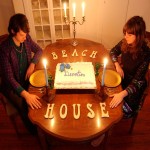Interview
XLR8R
February 2008
Link

The name Beach House may conjure up bright visions of white surf and grainy sand, but the origins of the Baltimore duo’s designation are, fittingly, much more vague.
“We were describing worlds that we felt described where we were at,” says singer/keyboardist Victoria Legrand of their choice of names. “And we had a ridiculous conversation about a beach party on the moon. Then we realized it could be confused with a Jimmy Buffet reference and we couldn’t go there.”
It’s a challenge to pin the music of Legrand and Alex Scally to one place or time, to accurately tag the duo’s narcotized and haunting grooves. Their music exudes a shifting sense of location and emotion that, along with its echoing production, makes the band’s sophomore album, Devotion, so enveloping and self-assured. Languid organ melodies and Scally’s gently coaxed slide-guitar lines wrap around each other like kudzu, while Legrand’s ethereal vocals and heavenly sighs pool up into dark clouds, lingering overhead like smoke. It’s a lush, sparkling work, reminiscent of Legrand’s own colorful, handmade jewelry (photographed for the cover of the band’s first album). A song is as likely to remind you of a spacious Motown single as it is a sad Appalachian country lament. “Country for us is Gram Parsons, Bob Dylan, Hank [Williams], and Patsy [Cline],” says Legrand. “It blurs with Motown, that same kind of reverb.”
The duo first began collaborating in 2005, after Legrand returned from a stay in Paris. Originally members of a larger group, Daggerhearts, Legrand and Scally split off in 2005 when the band started to get a bit dysfunctional. During a particularly spontaneous and productive period later that year, the two wrote the music that would eventually end up on Beach House’s self-titled debut.
“It was very natural,” says Legrand of the band’s ease in carving out their signature sound. “That’s just the way I roll–if I’m doing something weird, that’s the way it is. I was sleepy-sounding, and I didn’t mean to sound so much like Nico. I won’t say we were lucky, but much of this stuff came together in one session. We were so intense about it.”
The link between the albums is the track “Master of None,” according to Legrand, which points toward Devotion’s thicker sound. The cathartic track is a bit more ferocious, a bit more of the two letting go, she explains. It helped to point the duo towards a relaxing place they’re still trying to fully realize.
“In Baltimore, you can pretty much forget where you are,” says Legrand. “It forces you to forget about something. You don’t need to censor yourself. It enables you to do your own thing.”